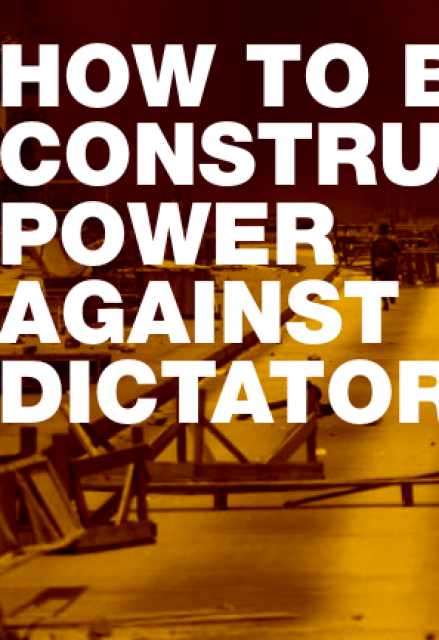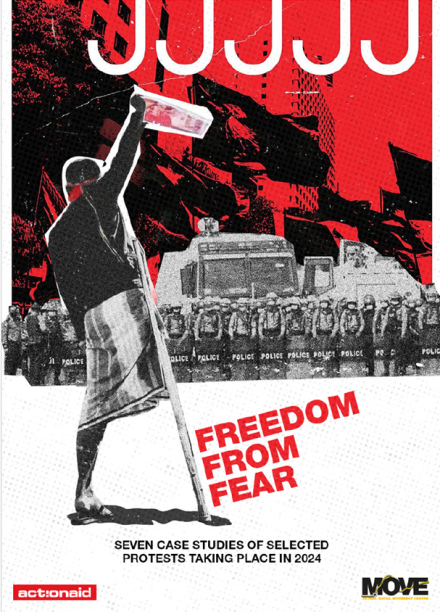In the grips of the pandemic I felt like I lost my voice. I went from speaking at colorful climate justice rallies to watching the scudding clouds from my sickbed. In short, I went from being an organizer and cofounder of Extinction Rebellion UK to being disabled by Post Covid Syndrome.
Over the last few years I have been dabbling in writing online as a way to find my voice again. It’s a vast world of clickbait, corporate media and quick news cycles that can easily drown out an authentic activist voice. It was then with great pleasure that I stumbled across a webinar by the International Center on Nonviolent Conflict on supporting activist writing. The session was led by a series of social justice editors, each offering their insights from years of alternative publication experience. Here’s who they are and what I learned.
Firoze Manji
Founder of Daraja Press and Pambazuka News and Press
There's a tendency among activists to decry theory as something that's outside their lived experience and daily organizing challenges. But practice without theory is as meaningless as theory without practice. In our writing, we must constantly try to find a way to harmonize the two for our readers to help them become effective activists.
Too few writers think of their readers specifically enough. Just to name a certain community or university isn't enough. In fact, try to identify a single person who represents the target readership. Paradoxically, when we write for one specific individual, our writing is more easily generalizable because it speaks directly to an issue in an accessible, human way. Throughout that writing, whether it be an article, thesis or book, maintain a single, overarching message that hammers home the key points. It's all too easy in our polycrisis world to stray from a single message, but as writers we must break down the world's complex ideas into digestible and engaging chunks for our readers.
In that message, remember that facts don't change minds, ideas do! Just as lawyers present their case before they present their evidence, writers too must first speak to their readers' hearts.
Central to effective activism is the endeavor to reclaim humanity and adopt global perspectives, as outlined by Ghanaian philosopher Sekyi-Otu:
No one needs the language of universalism more viscerally and no one speaks that language more eloquently than those who, precisely because of their intimate knowledge of abject exclusion and dehumanization, voice their incendiary fury and self affirmation in the name of the human.
- Sekyi-Otu, Left Universalism, Africacentric Essays
Therefore, the focus of our writing should be on amplifying the voices and experiences of frontline movements. Instead of focusing on expressing your own voice, think of yourself as a midwife—helping those in struggle find and birth their own voice.
Daraja Press invites volunteers to engage in groundwork for interviews and podcasts, seeking to uplift narratives that catalyze social change. For more, contact firoze at darajapress dot com.
Arzu Geybullayeva
Freelance journalist and regional editor with Global Voices
The vast majority of contributions to sites like Global Voices come from non-writers who are just eager to tell a story. That means that the first drafts which come in are far from publication-ready. With that in mind, be open to editors helping you to tweak your work to produce a stronger and clearer article. You can use the Global Voices writing guidelines to help.
Given that a strong relationship with an editor or a publication can be hard to form, stick to freelancing and writing for the ones with whom you build a relationship and look out for calls for submissions in your area/region of expertise.
Be careful of the hope that whatever you write will change people's opinions. It can lead to burnout. Instead, connect your writing to be part of the wider strategy of the communities that are leading the struggle. That way you are not isolated in your writing and you can help bolster an existing campaign rather than standing on your own.
On that note, be wary of applying foreign contexts to your own narrative and community. For instance, repression against LGBTQI communities under an autocracy, whether its Russia or Azerbaijan, will be different. Finding your own authentic narrative of the struggle will help the message reach your audience.
Writing can be hard, especially given the dwindling number of alternative platforms and increased repression on journalist freedoms (ed: see Azerbaijan Internet Watch, started by Arzu). Remember that even in the face of repression, you must keep writing, not just for the audience but to keep expressing your soul and your spirit.
Laurence Cox
Co-editor of Handbook of Research Methods and Applications for Social Movements, Edward Elgar Publishing, 2024
Writing is always for a specific audience. Helping writers guide their communication to that audience is crucial. Think about what stage of the journey you are on with your readers. We can usually divide these up into three stages: agitation, education and organizing. Agitating is acting to reach the unconverted audience, e.g by flyering. Education then guides your new recruits into the deeper and more structural mechanisms of the problem you're addressing. Organizing is then the work to empower these recruits to achieve the change through meetings and forming strategy.
Then it's time to consider where to write and what about. Instead of focusing on your own individual message, consider how you can support existing, alternative outlets with your writing. It's more likely to get you published and it helps contribute towards the collective spirit of publishing.
A great deal of writing these days has an Anglocentric focus. Take your story out of Washington and Westminster and into the hearts of the communities affected, especially with a multilingual approach. Similarly, don't write just as an activist. Learn from good writing from any community, whether it be books or poetry; look beyond the usual social media posts and national newspaper rhetoric.
The shift to social media and its changing dynamic has weakened a lot of our writing. Remember who is producing the mainstream media and what kind of clickbait and establishment opinions their editors want. Our strength is in creating our own media. Historically, alternative media has been the most popular way for underground and activist purposes to share our message.
Sack the teacher in your head. We've all likely first encountered the written word in a classroom and so we often write as if we are still trying to impress teachers. This power dynamic will filter your message to the wrong audience. Writing should be for your peers, not your teachers!
You can read and contribute to Laurence's affiliation, the Interface Journal, for more activist reflections on their learnings in resistance.
Eric Stoner
Founding co-editor of Waging Nonviolence
First focus on your goals for writing. For example, a key interest and goal at Waging Nonviolence is to focus on the question: “How are people building power across the world?”
Connect with the communities involved and be prepared to help translate their stories into articles. For example, from both activists and academics you will face a variety of jargon. Your job as a journalist is to translate that jargon into something that can engage the wider public.
As part of that engagement, try to reach your audience's emotions by also communicating the movements' vulnerabilities as well as the wins and actions. Adding emotion doesn't mean letting your anger, righteousness or inflammatory language rule your writing. It means framing your points for your audience to help the message break through.
These are often stories other media wouldn't tell, so help the communities involved to find their voice on the frontlines. Waging Nonviolence is open to your submissions and they will be hosting a free training for writers later this year.




